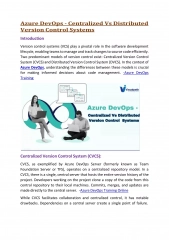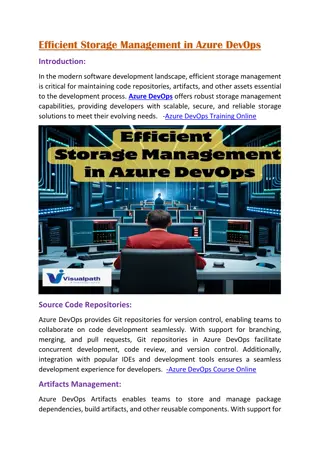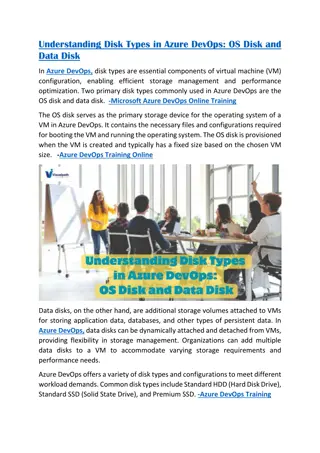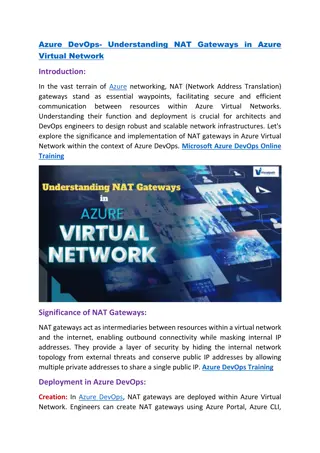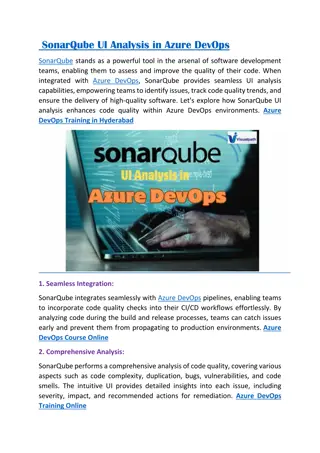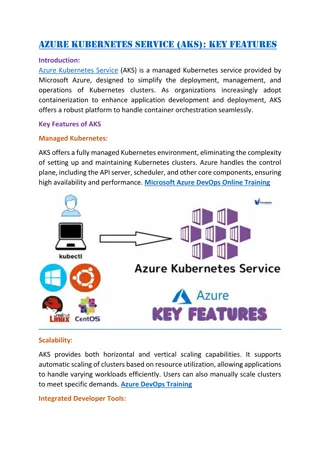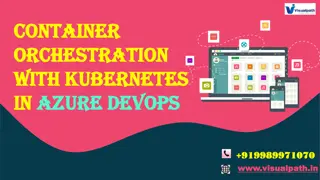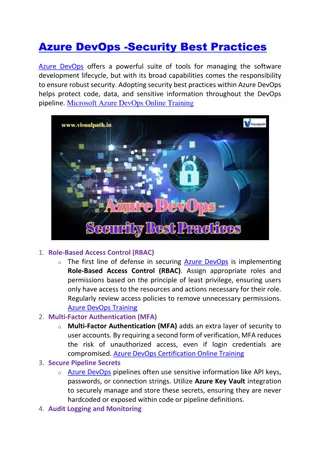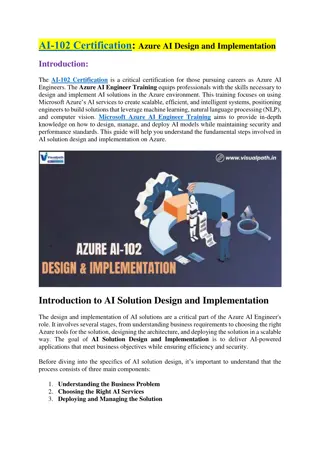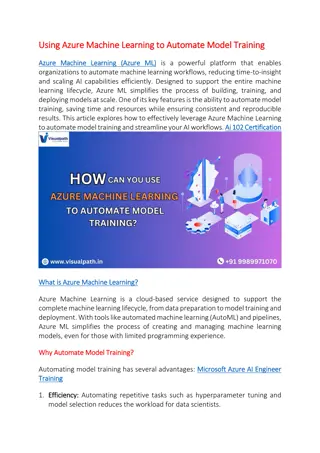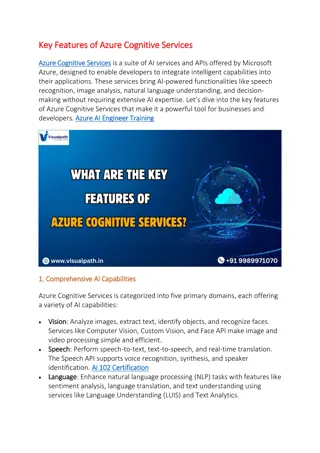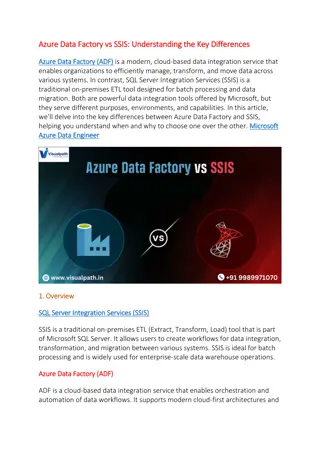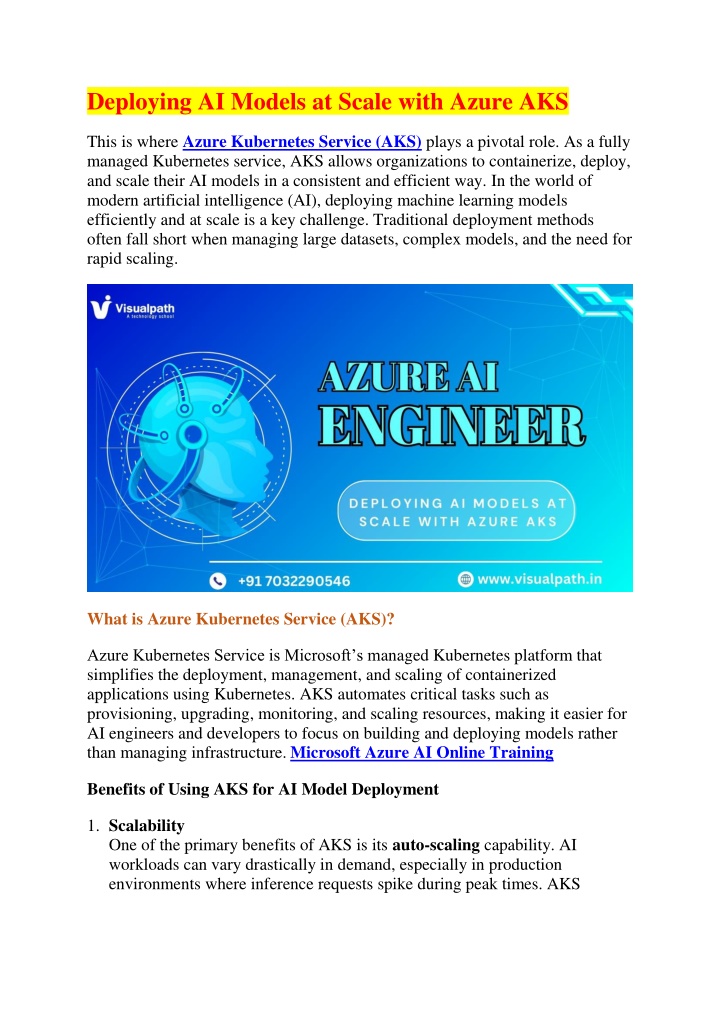
Azure AI-102 Course Hyderabad | AI Engineer Online Training
Boost your career with the Azure AI-102 Course in Hyderabad at VisualPath. Get hands-on experience and prepare for the Azure AI Engineer Online Training through real-time projects, flexible weekend batches, and lifetime access to course recordings. L
Download Presentation

Please find below an Image/Link to download the presentation.
The content on the website is provided AS IS for your information and personal use only. It may not be sold, licensed, or shared on other websites without obtaining consent from the author. If you encounter any issues during the download, it is possible that the publisher has removed the file from their server.
You are allowed to download the files provided on this website for personal or commercial use, subject to the condition that they are used lawfully. All files are the property of their respective owners.
The content on the website is provided AS IS for your information and personal use only. It may not be sold, licensed, or shared on other websites without obtaining consent from the author.
E N D
Presentation Transcript
Deploying AI Models at Scale with Azure AKS This is where Azure Kubernetes Service (AKS) plays a pivotal role. As a fully managed Kubernetes service, AKS allows organizations to containerize, deploy, and scale their AI models in a consistent and efficient way. In the world of modern artificial intelligence (AI), deploying machine learning models efficiently and at scale is a key challenge. Traditional deployment methods often fall short when managing large datasets, complex models, and the need for rapid scaling. What is Azure Kubernetes Service (AKS)? Azure Kubernetes Service is Microsoft s managed Kubernetes platform that simplifies the deployment, management, and scaling of containerized applications using Kubernetes. AKS automates critical tasks such as provisioning, upgrading, monitoring, and scaling resources, making it easier for AI engineers and developers to focus on building and deploying models rather than managing infrastructure.Microsoft Azure AI Online Training Benefits of Using AKS for AI Model Deployment 1.Scalability One of the primary benefits of AKS is its auto-scaling capability. AI workloads can vary drastically in demand, especially in production environments where inference requests spike during peak times. AKS
automatically scales the number of pods and nodes based on the load, ensuring performance remains consistent.Azure AI Engineer Certification 2.Containerization with Docker AI models can be packaged with all their dependencies into Docker containers. These containers can then be deployed on AKS clusters, ensuring that the environment is consistent across development, testing, and production. 3.CI/CD Integration AKS supports seamless integration with CI/CD pipelines through tools like GitHub Actions and Azure DevOps. This ensures that AI models can be trained, tested, and deployed automatically, streamlining the MLOps (Machine Learning Operations) process. 4.High Availability and Resilience With AKS, you can distribute AI workloads across multiple nodes and regions, ensuring high availability. It also supports self-healing features that automatically replace failed pods, ensuring minimal downtime. 5.GPU Support for Intensive Workloads For AI models that require significant computational power, such as deep learning models, AKS offers GPU-enabled nodes. This allows for faster training and inference while optimizing cost and resource utilization. 6.Monitoring and Logging AKS integrates with Azure Monitor, Application Insights, and Log Analytics, providing full visibility into model performance, usage patterns, and potential issues. These insights are crucial for troubleshooting and optimization.Azure AI Engineer Training Steps to Deploy AI Models Using AKS 1.Package the AI Model Create a Docker image that includes the trained model and a serving application (such as Flask, FastAPI, or TensorFlow Serving). 2.Push to Azure Container Registry (ACR) Upload the Docker image to Azure Container Registry, which can then be accessed by AKS clusters. 3.Create an AKS Cluster Use the Azure portal, CLI, or ARM templates to provision an AKS cluster with the necessary configuration (CPU/GPU nodes, autoscaling, networking, etc.). 4.Deploy the Model Using Kubernetes Manifests Define Kubernetes deployment and service YAML files to manage the containerized model application, then apply them using kubectl.Microsoft Azure AI Engineer Training
5.Expose the Endpoint Use Kubernetes Services (e.g., LoadBalancer or Ingress) to expose the model API to the internet or internal clients. 6.Monitor and Scale Use Azure Monitor and horizontal pod autoscaler (HPA) to keep track of resource usage and automatically scale the application based on demand. Conclusion Azure Kubernetes Service (AKS) provides a robust, scalable, and production- ready platform for deploying AI models. With its native support for containers, GPU workloads, autoscaling, and DevOps integration, AKS empowers AI teams to serve models reliably across a wide range of use cases. Whether you're working on computer vision, NLP, or predictive analytics, AKS offers the flexibility and performance needed to bring your AI solutions to scale effectively. Trending courses: AI Security, Azure Data Engineering, SAP PaPM Visualpath stands out as the best online software training institute in Hyderabad. For More Information aboutthe Azure AI Engineer Online Training Contact Call/WhatsApp: +91-7032290546 Visit: https://www.visualpath.in/azure-ai-online-training.html




